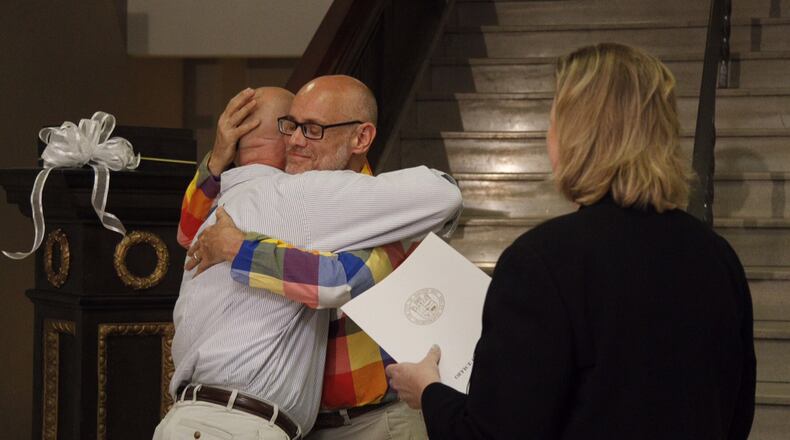“I’ve had tears of joy — almost disbelief. It has so long been unthought of that it could ever happen,” said Joyce Audus of Dayton, who on Friday celebrated 23 years as a couple with Linda Moore.
The couple wed last July in Maine.
“Getting married changed how we felt as a couple. We were surprised that saying the vows made a difference, but I think you feel a little validated. This is just a much, much bigger validation of our relationship and our love. To know that it’s legal here at home among the people that I’ve lived with and loved all my life, it’s an overwhelming thing,” Audus said.
Audus said she is hopeful for the future.
“For particularly young gay people, to be able to live the way their coworkers and the rest of their family does. To say this is my life, l am her wife or his husband. We were so blocked out of those kinds of endearments or titles. Their lives will just be different,” Audus said.
Her wife, Moore, said she felt a deep sense of satisfaction by the ruling.
“I just felt like it was an ending or a finality to everything having to do about difference. There is not a difference. We all love the same way,” Moore said.
Kettering couple Joyce Dean, 68, and Mary Ellen Batiuk, 65, married May 13, 2014, in Westfield, N.Y. The retired couple have long thought about moving to another state if Ohio continued to ban same-sex marriage.
“Well, I guess we are staying,” Batiuk said immediately after the announcement. “It’s good to be an American today.”
“I feel a little bit taller today,” Dean said.
The court’s decision relieved the couple.
“It’s indescribable the way this discrimination forms, or deforms, your psyche,” Batiuk said.
Added Dean, “You yourself don’t realize how much something hurts until it stops hurting.”
Yet the ruling also has practical ramifications. Recently, for instance, the couple discovered that Dean’s Social Security benefits couldn’t be shared with Batiuk despite their legal marriage in New York.
“This is a federal benefit,” Dean said. “I am horrified that Ohio would withhold our money by not recognizing we were legally married. It seems so bogus to me. It’s my money – I paid into the system.”
Jerry Mallicoat of Miamisburg said being legally married in New York and living in Ohio, where his marriage was not recognized as legal, has presented many challenges, from awkward social interactions, to laborious paperwork for taxes.
“If either of us had passed away before today, presumably, neither of us would be able to claim the others Social Security benefits or survivor benefits,” said Mallicoat, who married his husband, John Cummings, in July 2014 in New York.
“Still, as a 54-year-old gay man who started coming out at 17 in the late ’70s, it’s just overwhelming. It’s something I never ever thought I would ever see in my lifetime, and I’m pretty filled with emotion right now,” Mallicoat said.
Mallicoat said the couple would participate in Chicago’s gay pride march this weekend, “celebrating and waving the flags high.”
“People are tweeting us and sharing in our joy; it’s really amazing and overwhelming now. It’s really great now to feel like we are equal citizens under the law,” Cummings said.
“The most important thing is we are now able to live as actualized citizens in a country that declares that it believes that all people are created equal and that everyone has the right to pursue life, liberty and happiness, and now that’s been expanded to us something that always should have always been available to us, but unfortunately we have had to fight for decades to accomplish,” Mallicott said.
Pam Powers of Dayton was sitting in a meeting at her job at Wright-Patterson Air Force Base when she found out about Friday’s decision.
“My phone started blowing up with texts. So I had to keep my composure. It started sinking in while I was in my meeting. I got out and just cried. It’s an amazing thing. l never thought I’d see the day where Karen and I could call each other spouses in Ohio and across the country,” Powers said about her marriage to Karen Emery.
The couple, together for 23 years, married in 2013 in Maine.
“For me it’s been hard to shift from living in fear to having some hope and finally finding joy in this decision. It’s been a long road and there have been many disappointments along the way,” Emery said.
Powers said the Supreme Court decision will have a huge impact in many ways.
“Day to day, we live like any other married couple, so it won’t impact in that kind of way, but there are some big things legally that will be huge for us. We weren’t allowed to have each other as beneficiaries for Social Security. We could have been banned from being in the hospital room with the other person,” Powers said.
Powers said her co-workers at Wright-Patt have shown support.
“I’m out in the office and they have come up to me and have been very happy for me,” Powers said.
About the Author
